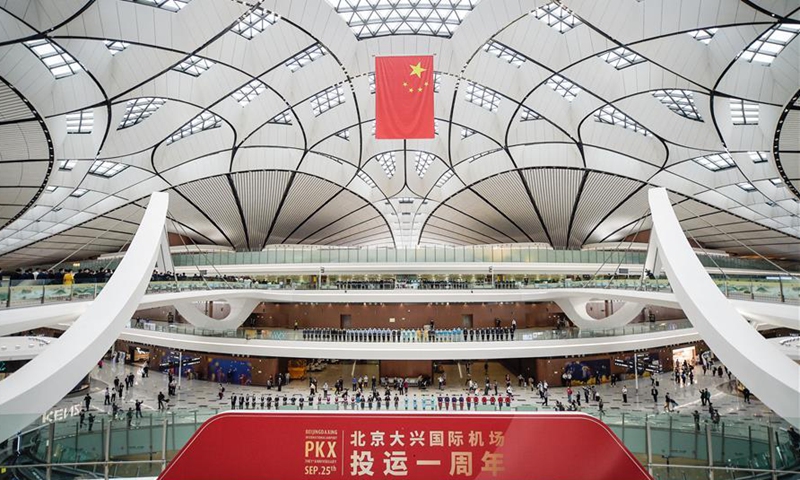Regulator extends suspension time for carriers taking in 5-10 infection cases
By Tu Lei Source: Global Times Published: 2020/12/17 11:06:29

A flag-raising ceremony is held by the Civil Aviation Administration of China to mark the first anniversary of the Beijing Daxing International Airport in Beijing, capital of China, Sept. 25, 2020. The Beijing Daxing International Airport celebrated its first anniversary on Friday. The total passenger throughput at the newly-built airport exceeded the 10 million mark on Tuesday after it began operation last September. (Xinhua/Peng Ziyang)
China's civil aviation regulator has decided to extend the suspension time for air flights if five or more on-board passengers test positive for the coronavirus, always putting safety as its top concern.
Civil Aviation Administration of China (CAAC) said on Wednesday that it will update its regulations for inbound flights, stating if five or more passengers test positive for COVID-19, the air route in question will be suspended for two weeks, one week longer than the previously required.
The rule of airlines would be suspended for four weeks, if 10 or more passengers are tested positive, the same as the previous standard.
The announcement was posted on the official website of CAAC, explaining that the move is to attribute to curbing the offshore COVID-19 cases being carried into China.
“The heightened regulation is not a remedy, more like a preventive move to control the virus from being imported to the country,” Lin Zhijie, an independent market watcher told the Global Times on Wednesday.
Over the past one or two months, sporadic infection cases have been identified in many cities in China. Since December, in less than half a month, cities such as Jiaozhou in East China’s Shandong Province, Chengdu in Southwest China’s Sichuan Province, and Manzhouli in North China’s Inner Mongolia Autonomous Region have seen local confirmed cases and asymptomatic infections.
As the spread of the pandemic in autumn and winter is on the rise, and new cases in some countries and region shave reached new record highs, meaning China is under heightened epidemic prevention situation, Lin explained.
Wu Zunyou, chief epidemiologist of Chinese Center for Disease Control and Prevention also said that, after the onset of winter season, other countries have experienced a sharp increase in the number of COVID-19 cases, which had placed rising pressure on the global fight on the deadly disease.
The latest example is that a pilot in Sichuan Airlines was confirmed as an imported case of COVID-19 on Monday.
Effective virus control
China introduced circuit breaker measures for inbound air flights on June 8, saying that the circuit breaker will be triggered when five passengers traveling on a flight operated by an airline test positive for the virus.
In this case, if less than 10 passengers show positive results, the said airline's flights on this route shall be suspended for one week. If 10 or more passengers test positive, the suspension will be extended to four weeks. Quota cut by the circuit breaker shall not be transferred to other flight routes. The airline can only resume its one-flight weekly schedule after the suspension ends.
Following the schemes introduction by CAAC, suspended flights have kept growing over recent months.
The suspended number of flight increased from 3 in June and 7 flights in July to more than 20 flights in August and September, and then to 52 flight in October, according to Han Guangzu, an official from CAAC on December 3. Later by November, the number of suspended flights has come down to around 20.
Han said a total of 259 inbound flights have been suspected since the new scheme was enforced.
In addition, domestic airlines are stepping up efforts to curb imported cases, and China Southern Airlines, the largest air carrier in China by fleet size, said that from November 3, it will stop taking passengers departing from 21 countries to China that transfer via a third country or region.
The countries include 10 in Africa including Ghana, Guinea and Ethiopia. There are also eight Asian countries on the list, including India, Bangladesh, Nepal and the Philippines. Russia and Brazil are also on the list. The carrier cited virus control as the reason for the decision.
China's National Immigration Administration also warned earlier those residents to continue to avoid cross-border travel at a time when many other countries are seeing COVID-19 caseload resurgence.
Different voices
However, there are still voices to advocate the air regulator to cancel the circuit breaker mechanism, claiming that it has made life difficult for the airlines, and it is not the airlines’ duty and responsibility to make sure the passengers to test negative upon arrival.
An anonymous industry insider who has been following the aviation industry for years told the Global Times that the airlines are hard to re-arrange the aircraft allocation, air crews shift and passengers itinerary once getting the notice from the regulator to suspend flying
It is hard to say who ought to shoulder the responsibilities, if passengers are eligible 48 hours before boarding, but later got infection, he added,given the fact that the probability of being infected onboard the aircraft is low.
More Chinese embassies have joined the push for pre-departure health codes based on coronavirus nucleic acid and the antibody testing, a prerequisite for China-bound travels, which requires that Chinese and foreign passengers flying directly to China should take nucleic acid and IgM anti-body tests within two days before departure.
Newspaper headline: Air flights taking notice
Posted in: BIZ FOCUS,AVIATION